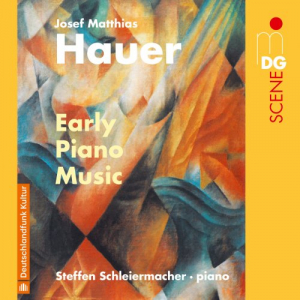Steffen Schleiermacher - Hauer: Early Piano Music '2022

| Artist | Steffen Schleiermacher Related artists |
| Album name | Hauer: Early Piano Music |
| Country | |
| Date | 2022 |
| Genre | Classical Piano |
| Play time | 01:15:01 |
| Format / Bitrate | Stereo 1420 Kbps
/ 44.1 kHz MP3 320 Kbps |
| Media | CD |
| Size | 242 mb |
| Price | Download $1.95 |
Order this album and it will be available for purchase and further download within 12 hours
Pre-order album Tracks list
Tracks list
Tracklist 01. Nomos in 7 Teilen for Piano, Op. 1: I. Vorgesang 02. Nomos in 7 Teilen for Piano, Op. 1: II. Anfang 03. Nomos in 7 Teilen for Piano, Op. 1: III. Übergang 04. Nomos in 7 Teilen for Piano, Op. 1: IV. Hauptsatz 05. Nomos in 7 Teilen for Piano, Op. 1: V. Rückwendung 06. Nomos in 7 Teilen for Piano, Op. 1: VI. Schluss 07. Nomos in 7 Teilen for Piano, Op. 1: VII. Epilog 08. Sieben kleine Klavierstücke, Op. 3: No. 1 09. Sieben kleine Klavierstücke, Op. 3: No. 2 10. Sieben kleine Klavierstücke, Op. 3: No. 3 11. Sieben kleine Klavierstücke, Op. 3: No. 4 12. Sieben kleine Klavierstücke, Op. 3: No. 5 13. Sieben kleine Klavierstücke, Op. 3: No. 6 14. Sieben kleine Klavierstücke, Op. 3: No. 7 15. Fünf Klavierstücke, Op. 15: No. 1 16. Fünf Klavierstücke, Op. 15: No. 2 17. Fünf Klavierstücke, Op. 15: No. 3 18. Fünf Klavierstücke, Op. 15: No. 4 19. Fünf Klavierstücke, Op. 15: No. 5 20. Nachklangstudien, Op. 16: No. 1, Freier Vortrag 21. Nachklangstudien, Op. 16: No. 2, Sehr gebunden 22. Nachklangstudien, Op. 16: No. 3, Eigensinnig 23. Nachklangstudien, Op. 16: No. 4, Pendelnd, wiegend 24. Nachklangstudien, Op. 16: No. 5, Hüpfend 25. Musik-Film, Op. 51: No. 1, Erwartung 26. Musik-Film, Op. 51: No. 2, Schmachtende Liebe 27. Musik-Film, Op. 51: No. 3, Entschlossener Angriff 28. Musik-Film, Op. 51: No. 4, Siegeszuversicht 29. Musik-Film, Op. 51: No. 5, Groteske 30. Musik-Film, Op. 51: No. 6, Walzer 31. Musik-Film, Op. 51: No. 7, Reiterstückchen 32. Musik-Film, Op. 51: No. 8, Andacht 33. Musik-Film, Op. 51: No. 9, Plauderei 34. Musik-Film, Op. 51: No. 10, Sport 35. Musik-Film, Op. 51: No. 11, Betrübnis 36. Musik-Film, Op. 51: No. 12, Sturm 37. Musik-Film, Op. 51: No. 13, Entsagung 38. Musik-Film, Op. 51: No. 14, Andante 39. Musik-Film, Op. 51: No. 15, Holperige Fahrt 40. Musik-Film, Op. 51: No. 16, Rüpeltanz 41. Musik-Film, Op. 51: No. 17, Zauberflug 42. Musik-Film, Op. 51: No. 18, Verglühende Leidenschaft 43. Musik-Film, Op. 51: No. 19, Wogende See 44. Musik-Film, Op. 51: No. 20, Schleichende Stunden 45. Musik-Film, Op. 51: No. 21, Spatzenballett At the same time as Arnold Schönberg, Josef Matthias Hauer developed a very individual system for twelve-tone composition. The works of the two Austrians could not be more different, as Steffen Schleiermacher has impressively documented in several album productions. Now the versatile pianist has addressed Hauer's earliest works, providing an exciting insight into an important chapter of 20th-century music history. Hauer calls his opus 1 "Nomos", which implies a great claim: like a law of nature, this composition already contains everything that makes up music - new works are only further elaborations. Of course, the public at the time could not follow Hauer in this - the premiere of the orchestral version did not even take place until 30 years after Hauer's death. Of the few works by Hauer that make it onto today's program from time to time, the "Nachklangstudien", which in their delicate texture develop a very special, somehow oriental aura, are probably the best known. Quite different are the "Five Little Pieces" from the same year, which, with their reminiscences of Reger and other contrapuntalists, seem almost traditional. The cycle "Music-Film" is downright enigmatic. The 21 character pieces have programmatic titles, as if they were meant to illustrate a silent movie - or are they even a parody of this genre? In any case, Hauer actually wanted to publish the collection under a pseudonym. And indeed, the pieces have nothing in common with Hauer's other tonal language. Steffen Schleiermacher, however, approaches this work with the same seriousness as he does the other pieces, and he succeeds in a fascinating rehabilitation for someone who has been unjustly almost completely forgotten.
Related artists
Steffen Schleiermacher
Album
- 2023 Le Piano du Groupe des Six
- 2022 Hauer: Early Piano Music
- 2021 Satie: Piano Music, Vol. 8
- 2016 Asia Piano Avantgarde - Japan, Vol. 2
- 2016 Mompou: Fetes Lointaines
- 2011 British!: Piano Music
- 2006 Asia Piano Avantgarde - Japan, Vol. 1
- 2004 Piano Music of the Darmstadt School Vol. 2
- 2004 Schleiermacher: Piano Pieces
- 2002 John Cage: Complete Piano Music Vol. 9 - Etudes Australes
- 2001-2019 Satie: Piano Music Vol. 1-6
- 2000 Piano Music of the Darmstadt School Vol. 1
- 1998 John Cage: Complete Piano Music Vol.2
- 1998 John Cage: Complete Piano Music Vol.3
- 1997 John Cage: Complete Piano Music Vol.1
- 1995 Gesang Des Apsyrtos
- 1995 Soviet Avant-Garde I (Protopopov - Mosolov - Lourie - Roslavets) (2003 hat ART)
